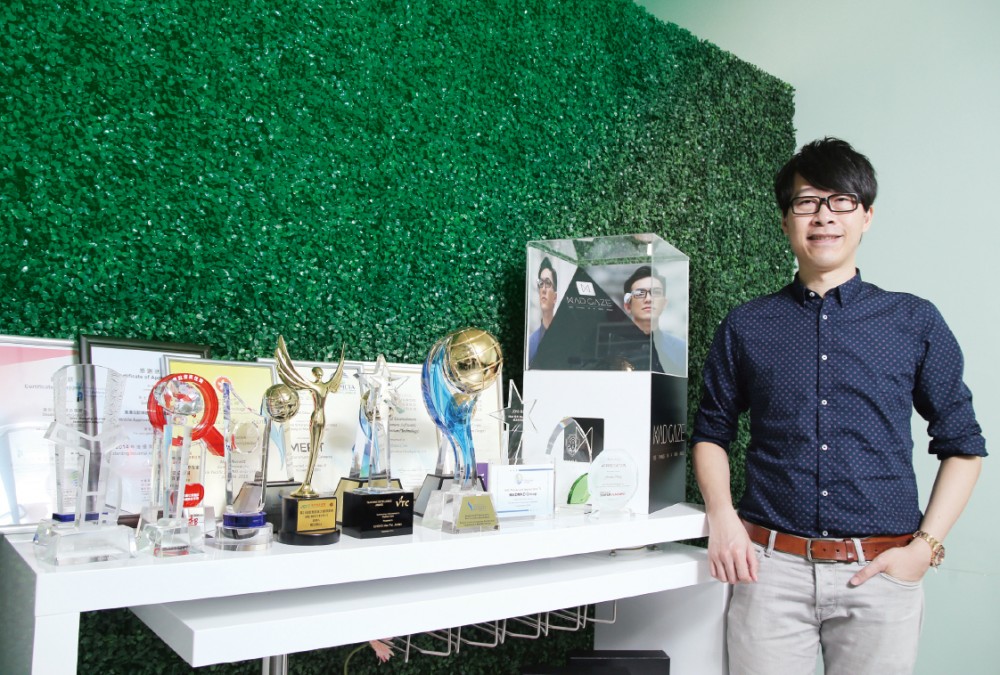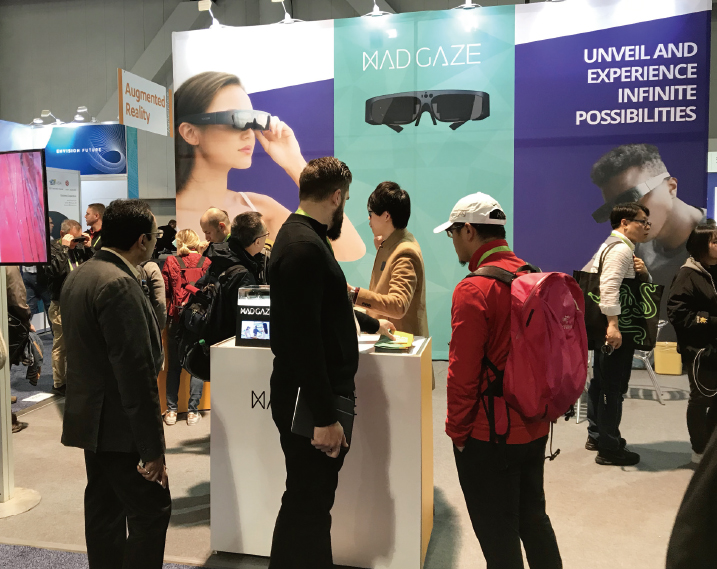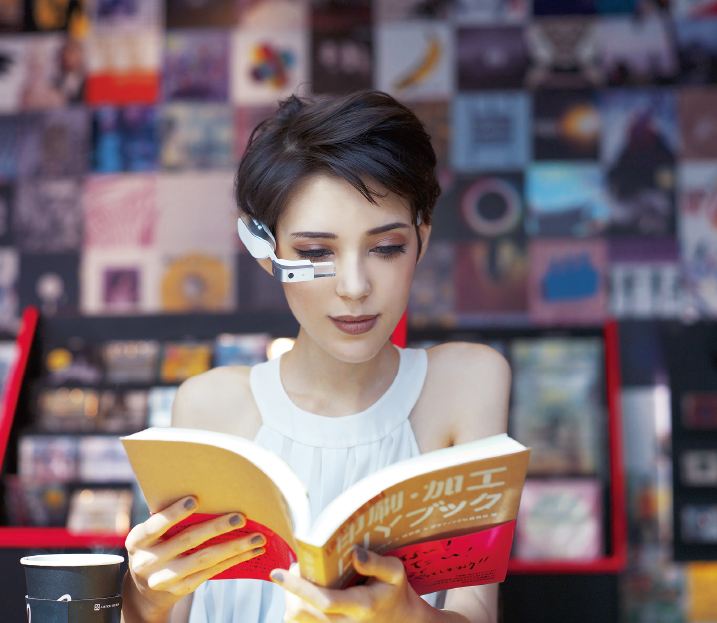A teaching position in a tertiary institute should have warranted a steady life, but Jordan Cheng, who studied information engineering at university, did not follow the mainstream path. Instead, he decided to resign from his teaching post and started his own business in innovation and technology after he had saved up the initial funds.
Jordan Cheng developed a strong interest in science since he was young. He began to stand out in his university years, winning the second place in the IEEE Computational Intelligence Chapter graduation project contest, as well as the champion of the Amway Pan-Pearl River Delta Region Universities IT Project Competition with his graduation report on developing a multi-touch surface. In addition to these accolades, he also attracted investors’ attention. “The idea to start my own business germinated back then. Although my creativity was appreciated by investors, I was only a university graduate. How could I secure the funds and commission a factory to help produce the molds and samples?”
Initial hiccup put no stop to entrepreneurial dream
 Cheng shelved his start-up plan temporarily and joined the workforce and became a computer engineer at first. Yet, work was monotonous and there was no space to exert his creativity. One year later, he joined the Hong Kong Institute of Vocational Education and was paid a monthly salary of HKD70,000. He stayed close to the latest trends of technological development and started saving for his future business. “I taught four years and kept saving. The moment I had enough money, I seized the opportunity to actualize my dream.”
Cheng shelved his start-up plan temporarily and joined the workforce and became a computer engineer at first. Yet, work was monotonous and there was no space to exert his creativity. One year later, he joined the Hong Kong Institute of Vocational Education and was paid a monthly salary of HKD70,000. He stayed close to the latest trends of technological development and started saving for his future business. “I taught four years and kept saving. The moment I had enough money, I seized the opportunity to actualize my dream.”
New business for developing new products
In 2012, Cheng resigned from his well-paid teaching post and founded MAD MAD Group, a company that worked mainly on commissioned coding projects for mobile phone applications. The company gained a seven-digit profit in its first year. Yet, coding was not the aspiration of Cheng. The ultimate objective for starting the business was to develop breakthrough technology products that could improve the quality of life and tap into the international market. After rounds of researches and considerations, Cheng reckoned the yet-to-mature smart glasses market with enormous potential matched his business roadmap. He therefore founded another smart glasses company the next year to engage fully in the research and development of the self-owned brand MAD Gaze.
Despite the general optimism in the potentials of augmented reality (AR) in the technology industry, smart glasses that ride on AR remain a niche product to date. Cheng frankly commented that the development of smart glasses requires the support of substantial funding. The lesson learnt by the not-so-successful Google Glass was detrimental to investor confidence. Added with the fact that there is only a small pool of experienced talents in developing smart glasses, growth of the sector has stayed stagnant. “The most frequent comment I received while seeking investors was: ‘When monetary and resource investment failed to bring Google success, you should know smart glasses are not going to make it’. I certainly cannot accept this view. On the contrary, I think we can learn from the experience of Google and optimize our products on their looks and various technology aspects to win over customers.”
Strong execution appreciated by investors
 Cheng believes that future development in smart households or even smart cities would be the trend to stay. Smart glasses would have a role to play with no doubt. As such, he and his business partners made personal investments to kick off preliminary research to demonstrate their own confidence to investors. In fact, when research work began, the strong execution of the team gained support from a number of angel investors. “As for talents, we have been focusing our recruitment efforts on those who specialized in the production of mobile phones and electronic products. We bring people together to jointly develop smart glasses and to accumulate experience.”
Cheng believes that future development in smart households or even smart cities would be the trend to stay. Smart glasses would have a role to play with no doubt. As such, he and his business partners made personal investments to kick off preliminary research to demonstrate their own confidence to investors. In fact, when research work began, the strong execution of the team gained support from a number of angel investors. “As for talents, we have been focusing our recruitment efforts on those who specialized in the production of mobile phones and electronic products. We bring people together to jointly develop smart glasses and to accumulate experience.”
In the summer of 2016, Cheng launched the first-generation smart glasses of MAD Gaze. They could be used for tourist’s translation, video conferencing, live casting of teaching and medical operation demonstration, security, automobile or plane service and maintenance (instant retrieval of maintenance manual), as well as logistics and warehouse management (information scanning on goods), etc. The glasses also supported Android applications. However, clear visibility of the virtual images projected on the lens under bright light conditions is yet to be actualized. Therefore, first-gen MAD Gaze was not suited for outdoor use.
After Cheng and his team had collected the views from the general public and customers, they worked hard on their researches again. The second-generation of MAD Gaze products was launched in early 2017. New enhancements include a new coating formulation for the lens, as well as an upgraded algorithm for app-switching. The optical functions were fully improved, so that users can see the virtual images projected on the glasses clearly under outdoor conditions. This is particularly helpful for live-casting, video-shooting or other related activities. A touchpad was also added to work as a mouse so that Android apps can be directly controlled. Thanks to these enhancements, sales of the second-gen smart glasses were 20 times more than its predecessor! Many customers commented that they were happy with the clarity of the new product, which was a huge encouragement to Cheng and his team and boosted his confidence in market expansion. In the future, he will be more proactive in perfecting the technology and the aesthetics of new products. He aspires to become a pioneer in promoting the popularization of smart glasses.
Aspiring to become market leader with technological breakthrough
 “There are only a dozen or so smart glasses brands in the whole world. As the market is yet to become a popular one, not a single brand has developed a leading position. In other words, excellent products with technological breakthroughs will naturally secure their market positions.” Cheng pointed out that technology magnates such as Apple and Samsung are actively developing smart glasses. MAD Gaze has already planned to roll out its third-gen products during the year, which would feature more mature AR and optical technology and is targeted at tablet users. The product has an objective to become a first mover in the market, hoping to achieve a 10-fold growth in sales and gradually replace tablets.
“There are only a dozen or so smart glasses brands in the whole world. As the market is yet to become a popular one, not a single brand has developed a leading position. In other words, excellent products with technological breakthroughs will naturally secure their market positions.” Cheng pointed out that technology magnates such as Apple and Samsung are actively developing smart glasses. MAD Gaze has already planned to roll out its third-gen products during the year, which would feature more mature AR and optical technology and is targeted at tablet users. The product has an objective to become a first mover in the market, hoping to achieve a 10-fold growth in sales and gradually replace tablets.
Cheng revealed that MAD Gaze is not only focusing on the local market, but also striving to expand into overseas market by taking part in trade fairs. The advantages of its products have been covered in international media and many overseas buyers placed orders on site, or even discussed collaborations as the regional distributor. A while ago, MAD Gaze signed sole regional physical store distribution agreements with buyers from Spain and Ireland. Taobao, on the other hand, would become the sole online distributor in the Mainland. These all paved way for the international market. “From the first day of founding MAD Gaze, I have set a long-term goal to replace smart mobile phones with smart glasses. Undoubtedly, smart glasses are yet to be lighter and more convenient than mobile phones. However, with further researches and enhancements, smart glasses are expected to be more and more popular, and become a wearable electronic device that everyone enjoys to use in the future.”




